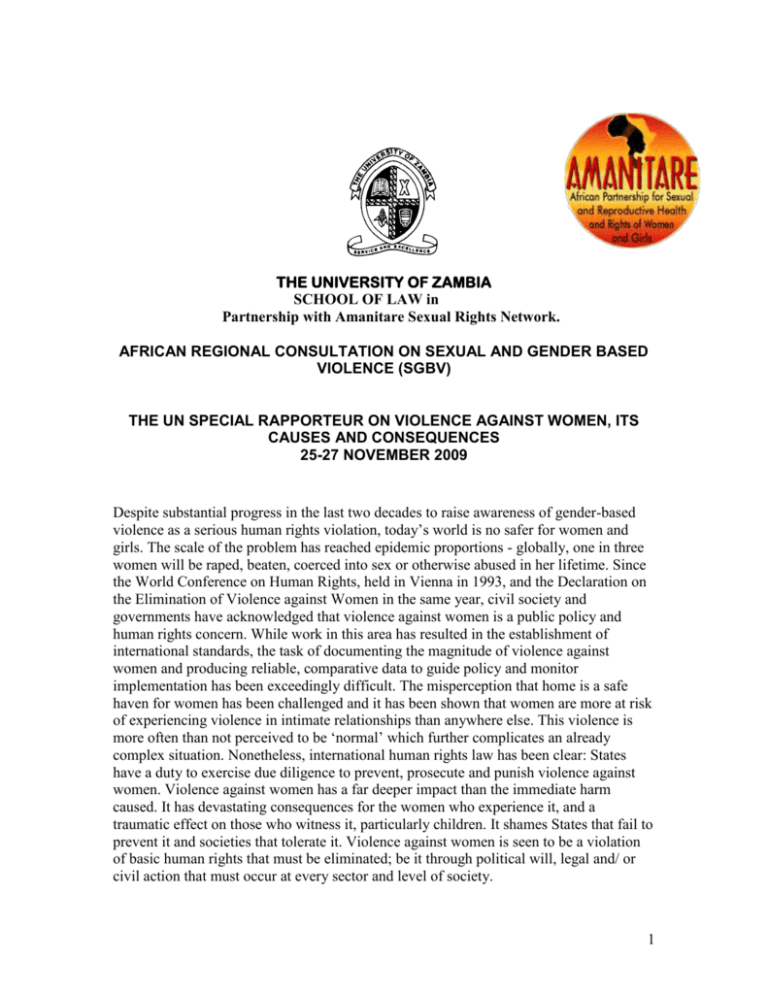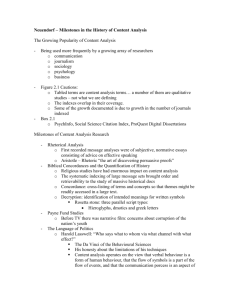
THE UNIVERSITY OF ZAMBIA
SCHOOL OF LAW in
Partnership with Amanitare Sexual Rights Network.
AFRICAN REGIONAL CONSULTATION ON SEXUAL AND GENDER BASED
VIOLENCE (SGBV)
THE UN SPECIAL RAPPORTEUR ON VIOLENCE AGAINST WOMEN, ITS
CAUSES AND CONSEQUENCES
25-27 NOVEMBER 2009
Despite substantial progress in the last two decades to raise awareness of gender-based
violence as a serious human rights violation, today’s world is no safer for women and
girls. The scale of the problem has reached epidemic proportions - globally, one in three
women will be raped, beaten, coerced into sex or otherwise abused in her lifetime. Since
the World Conference on Human Rights, held in Vienna in 1993, and the Declaration on
the Elimination of Violence against Women in the same year, civil society and
governments have acknowledged that violence against women is a public policy and
human rights concern. While work in this area has resulted in the establishment of
international standards, the task of documenting the magnitude of violence against
women and producing reliable, comparative data to guide policy and monitor
implementation has been exceedingly difficult. The misperception that home is a safe
haven for women has been challenged and it has been shown that women are more at risk
of experiencing violence in intimate relationships than anywhere else. This violence is
more often than not perceived to be ‘normal’ which further complicates an already
complex situation. Nonetheless, international human rights law has been clear: States
have a duty to exercise due diligence to prevent, prosecute and punish violence against
women. Violence against women has a far deeper impact than the immediate harm
caused. It has devastating consequences for the women who experience it, and a
traumatic effect on those who witness it, particularly children. It shames States that fail to
prevent it and societies that tolerate it. Violence against women is seen to be a violation
of basic human rights that must be eliminated; be it through political will, legal and/ or
civil action that must occur at every sector and level of society.
1
Africa, as a continent, is not faring well on any of the commitments it has made at
numerous regional and international conventions (CEDAW), treaties, protocols(Maputo
and SADC Declaration on gender and violence against women) and other consensus
documents such as the Millennium Development Goals to establish and maintain
women’s human rights and provisions. Gender equality on the continent remains elusive
and women continue to experience everyday violent warfare as a result of discrimination
that renders them vulnerable to violence, exploitation and abuse. It is well documented by
human rights activists that the scale of violence against women in Africa has escalated
and taken on alarming proportions in its manifestation and prevalence. Even in relatively
stable societies where women are not exposed to the fallout of armed conflict, violence
against women in those countries continues to spike, leaving women and girls to live out
the lived reality of their daily lives in perpetual terror of violation in both public and
private spaces.
Political freedom has not translated into freedom of choice for women, and this is
especially visible around the issue of procreation and the reproductive capacity of
women.
Sexual and Reproductive health and rights for women are attained through sound policy
frameworks with laws and policies that enshrine a government’s political will and their
commitments to upholding these rights. Alongside rights it is essential that consistent,
adequate, integrated service provision, education and training of health personnel, public
awareness and information campaigns, research and development programmes and
adequate budgetary allocations occur. Key ingredients to the success of ensuring that
these rights and provisions materialize is promoting gender equality and ending all forms
of discrimination against women.
Sexuality is an integral part of every human being. Yet, in many parts of African
communities, procreation is considered as the main reason and often only reason for
women to express sexual feelings. The strong emphasis placed on paternity and
ownership of the means of procreation (women’s bodies) has given rise to a myriad of
rituals and rites of passage that negatively impact on women. For example, virginity
testing, female genital mutilation or cutting and the stoning of women for adultery are
still widely practiced forms of control of women’s reproductive capacity. The importance
of the community versus the individual which is a large part of an African world view,
impacts differently on women in that the survival of the society is placed above the
individual needs, and in this case, the expression of sexuality. Sexuality is thus shrouded
in secrecy, myths and stereotypes which are compounded by traditional, religious and
moral frameworks that give higher priorities and responsibilities, proscriptions and
prescriptions of acceptable behaviour for women. The consequences of this have farreaching implications resulting in sexually transmitted diseases including HIV and AIDS,
unwanted pregnancies, coercive violent behaviour but more dramatically, attacks on
women to dishonour the men and/or the community.
2
The need for widespread solutions, practices and policies to end this form of
discrimination against women is critical. Not only does it undermine the physical and
psychological well-being of more than half of any given country’s population, it eats at
the very fabric of society, undermining social and economic development and further
aggravating poverty and its related issues. Africa has a unique opportunity at this time to
highlight these regional and national specificities of the failure of governments to fulfill
their commitments, in the form of the Special Rapporteur on Violence against Women.
This is the first time that this role has come to Africa and it requires that we seize the
moment to assist the Special Rapporteur to gain greater visibility in Africa and inform her
of the violations of women’s rights occurring in the region.
The purpose of the consultation meeting is two-fold. Firstly, to give higher visibility to
the situation of women’s rights on the continent; and to ensure that regional priorities are
taken into account. Secondly, the meeting is to act as a platform for the development of
recommendations to state parties, the creation of linkages between the UNSRVAW and
individuals and organisations that work on sexual violence women and girls and on the
promotion and protection of women’s human rights generally. The third aim is to assist
the UN Special Rapporteur on Violence against Women (UNSRVAW) to gain more
visibility in Africa; to enhance her mandate through the exchange of information, the
sharing of ideas and strategies on how to approach emerging issues in respect of sexual
violence against women and girls in the region in peace times.
Further objectives include finding ways to end impunity and seeking measure for redress.
The objectives of the consultation meeting are to:
1. Meet the UNSRVAW and learn about the mandate and how that can assist in
addressing violence against women.
2. Develop regional capacity to use the United Nations system
3. Build solidarity amongst African women and assist in developing a strong
regional voice for national level advocacy and regional advocacy.
4. Identify the manifestation (forms and prevalence), causes and impact of sexual
violence on women and girls in the absence of war in Africa;
5. Collect information on existing laws, policies and projects relating to violence
against women generally, and to sexual violence against women and girls
specifically, from a state perspective and/or supported/condoned by the state
6. Establish the participating countries’ international law obligations in the area of
sexual violence against women and girls and the gaps therein;
7. Develop recommendations to state parties to end sexual violence against women
and girls and (e) to create linkages between the UNSRVAW and individuals and
organisations that work on the promotion and protection of women’s human
rights on the African continent, and thereby facilitate information exchange and
co-operation between civil society and the UN.
3
Outcomes of the meeting
50 women will be brought together from the African continent and work together
to identify the various violations of women’s rights that take place.
A data base of women activists working on violence against women will be
produced as a reference for the UNSRVAW
They will work together to devise strategies to address violence against women
regionally.
The women will develop their capacity to utilize the United Nations Special
Rapporteur on Violence against women effectively to raise awareness of violence
against women its causes and consequences and the impact on women.
A report will be produced that will be widely disseminated and this will assist
activists to develop advocacy strategies at the country level.
Prepared by: Chuma Himonga ( University of Zambia/University of Cape Town)
Lesley Ann Foster ( Masimanyane Women’s Support Centre)
4










